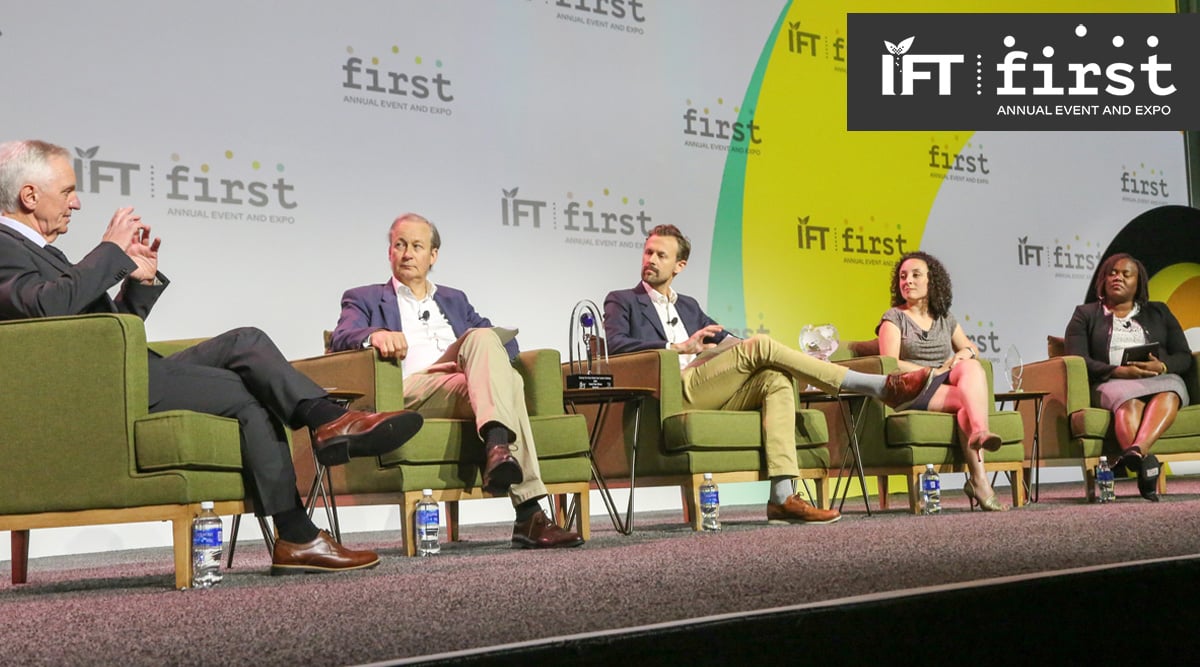Seeding the Future Challenge Winners Create Connections to Drive Change
Three of the 14 winners of the second annual Seeding The Future Global Food System Challenge shared their respective visions for improving the global food system in the Tuesday morning keynote at IFT FIRST.
To kick off day two of IFT FIRST, Bernhard van Lengerich, founder of the Seeding The Future Foundation, sat down with representatives from three of the 14 organizations that were awarded funding in the second annual Seeding The Future Global Food System Challenge to share their respective visions for improving the global food system. Moderated by Michiel de Ruiter, chairman of the European Institute of Technology, Food Division, the discussion began with van Lengerich telling attendees about the Challenge and his reason for creating and funding it. “Our mission is to support impactful innovations that can transform food systems, to enable food solutions that are more nutritious, more sustainable and equitable for everyone, and ultimately improve personal and planetary health,” said van Lengerich.
de Ruiter then introduced the three winners joining van Lengerich on stage for the conversation: Rob Johnson, CEO of Acceso (winner of a Grand Prize); Julia Kurnik, senior director, innovation startups at World Wildlife Fund (WWF) (winner of a Growth Grant); and Innocensia John, postdoctoral researcher at University of Dar es Salaam in Tanzania (winner of a Seed Grant). A commonality among the winners quickly became apparent as the conversation began. All three organizations are working on making connections between farmers and crops and buyers and consumers.
In the case of Acceso, the connections between farmers and buyers—and ultimately consumers—required the construction of a new value chain to solve an existing problem—the presence of aflatoxins in peanuts, a crop that is consumed heavily in Haiti. Acceso determined that in order to eliminate the cancer-causing mycotoxin and connect the farmers with buyers that were looking for a safe and abundant source of peanuts, they would need to develop a new social enterprise system “where we actually place ourselves in between the farmer and the buyer so that the two can work together sustainably, efficiently, effectively,” explained Johnson.
“We have a system that uses a combination of incentives, testing, and logistics,” said Johnson. “Farmers are incentivized to sell through this platform, because they get fair prices and they get access to inputs. Buyers are incentivized to buy through this platform … they have stable prices, they have convenient and optimized delivery schedules. And then we basically put in between the two, the logistics, the testing, the warehousing … to connect these dots.”
The value chain between crops and consumers is something that John has been working on at the University of Dar es Salaam. She explained that Tanzania has 28 orphan crops—sometimes called underutilized or neglected crops—that include foods like cowpea, pigeon pea, jackfruit, and monkey orange. The University was awarded a Seed Grant to assist with its research into these orphan crops and what can be done to incentivize farmers to grow them and educate consumers about them. The first step, John explained, is to trace the crops and see where they are found, if they are making it to markets, if farmers are aware of the value of the crops, and ultimately what consumers are saying about these crops.
Making connections between farmers and consumers is vital not only in countries like Haiti and Tanzania, but also in more industrialized countries like the United States. That is what the WWF’s Farmers Post program is attempting to do and why it was awarded a Growth Grant in the Seeding The Future Global Food System Challenge. “There's really a lack of connection directly between farmers and consumers,” explained Kurnik. “And this hurts pretty much everyone across the entire supply chain.” She went on to say that U.S. produce farmers make just 7–8 cents on every dollar spent on fruits and vegetables in the grocery stores. At the same time, just one in 10 American adults—and just one in 14 minority adults—eats enough fruits and vegetables a day. So, the WWF is working to establish a system that leverages the U.S. Postal Service (USPS) as a way to help bring fresh produce from American farms to front doors across the country.
“We envisioned … a platform, a website where someone can go put in their zip code and order from local farms,” said Kurnik. “Farmers don’t need to vertically integrate. They don’t need to build their own websites. They don’t need to do their own marketing.”
Two pilot programs are running—one in Connecticut and one in Virginia—using two different models of working with the USPS to see which one works the best. The WWF plans to take those learnings and expand the program.
The impact of the Seeding The Future Global Food System Challenge is apparent. In just its first two years, the Challenge has already had applications from more than 1,500 teams from 75 countries. The interest and passion from the teams submitting applications led van Lengerich to realize that awarding funds to only 2% of those submitting applications wasn’t going far enough. Therefore, the Seeding The Future Foundation and IFT will be launching a Global Food Impact Innovator Network to achieve the following goals:
- Create a community to enable innovators to connect with and learn from each other.
- Make available access to external expertise so startups and new ventures have people to turn to when they face challenges or have questions.
- Provide access to the value chain stakeholders, philanthropy, and capital, “so they have access to, on a larger scale, more than we would ever be able to do,” explained van Lengerich.
The objective is for the Network to support innovators in making connections to ensure they can continue to create solutions that connect the dots and ultimately build a safe, more abundant, and reliable food system for all.
Food Technology Articles

Cultivating a Crop of Food System Solutions
Five organizations dedicated to eliminating hunger and sustainably boosting nutrition earn top honors in this year’s Seeding The Future Global Food System Challenge.

Production Capacity Expands for Food to Fight Malnutrition
Production capacity for ready-to-use therapeutic food Plumpy’Nut at Edesia expands thanks to a Bezos family donation.

Future Food-Tech 2024 Tackles Transformation, Underscores Collaboration
Mission-driven Future Food-Tech exhibitors and conference presenters showcased innovative, transformative ingredients and technologies and emphasized the importance of collaboration in addressing food system challenges.

Whipping Up a Bright New Idea
A profile of whipped cream category innovator Whipnotic.

Natural Product Expo West Attention-Getters: Highlights From the Event
Food Technology Contributing Editor Linda Milo Ohr reports on trends she tracked at Natural Products Expo West 2024.
Recent Brain Food

Grasping the Transformative Power of AI
An artificial intelligence expert outlines why AI literacy is critical to the future of food.
The Promise of Underutilized and Biofortified Crops
A new IFT white paper explores two approaches with big potential for combating global malnutrition.
Supporting Sustainable Innovation
Health, welfare, and sustainability concerns have spurred consumers to explore plant-based alternatives. In this sponsored content interview, global ingredients company ofi discusses the forces driving this growing trend, and how it supports product innovation in this emerging category.
December Content Spotlight: Product Innovation
Stay up to date on the latest product innovation topics and trends with IFT's featured resources, from blogs to peer-reviewed articles to podcasts.
October Content Spotlight: Food and Nutrition Security
Stay up to date on the latest food and nutrition security topics and trends with IFT's featured resources, from blogs to peer-reviewed articles to solutions-based white papers.




